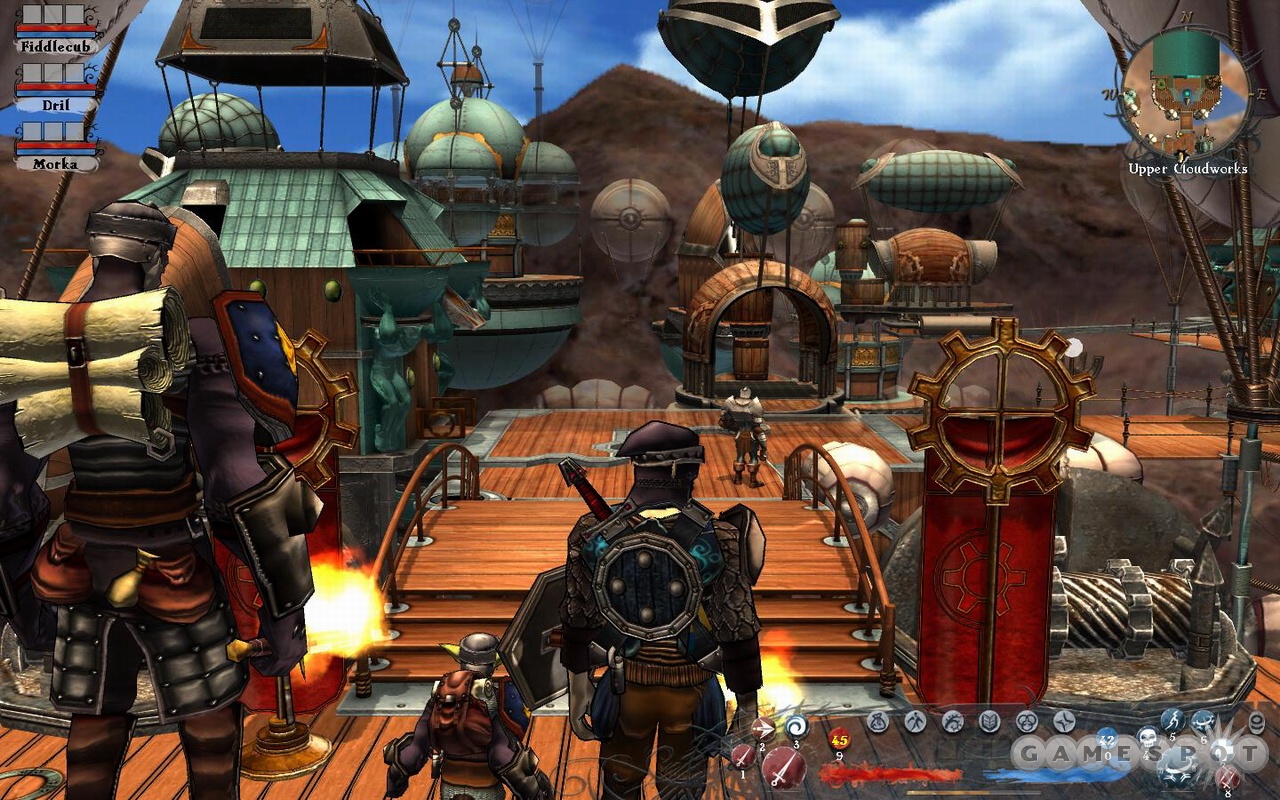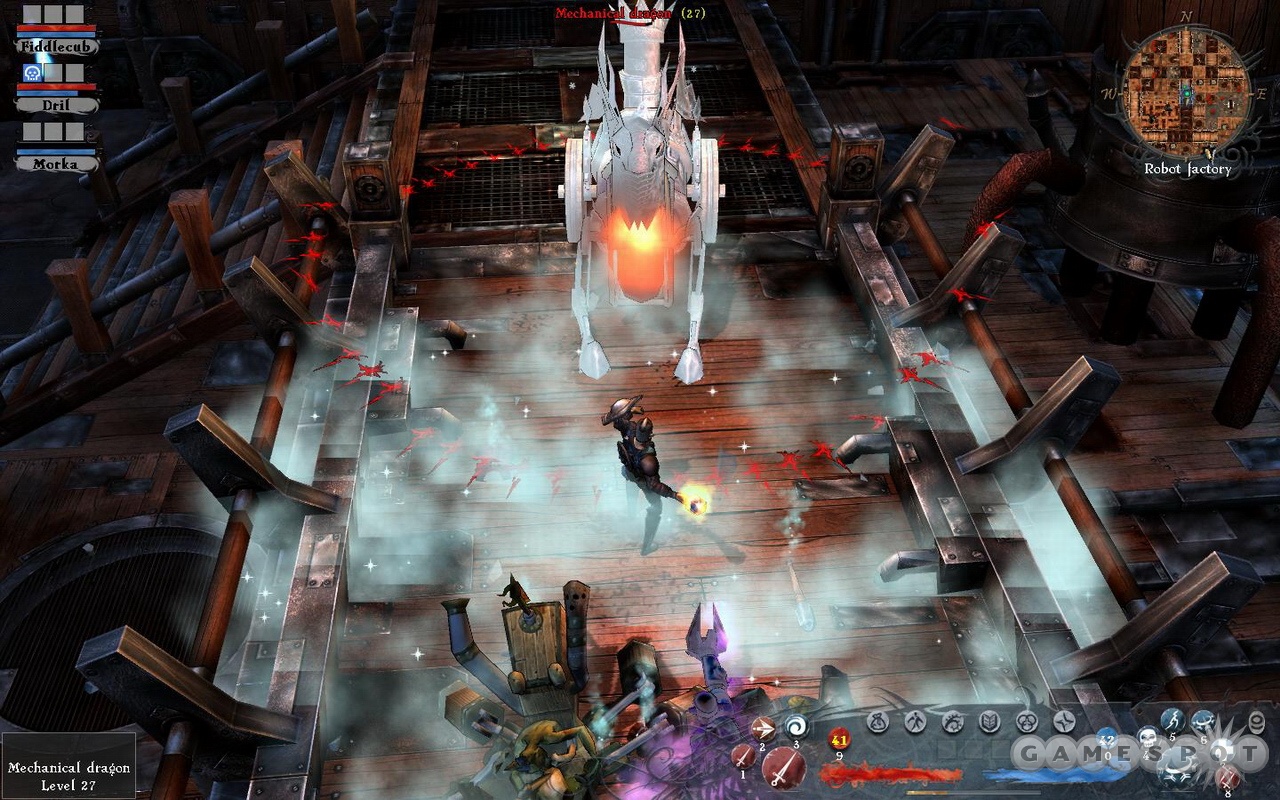Silverfall is the latest in a long line of action role-playing games, and it's brimming with possibilities. It's got neat cel-shaded character models, a whole lot of cool monsters, and the tried-and-true clickfest Diablo formula going for it. It could have used a whole lot of buff and polish, though, and sloppy design elements wiggle their way into almost every aspect of the game. If you like action RPG's, you'll get a good amount of gaming out of Silverfall, but you won't find any of the slickness of Dungeon Siege II or Titan Quest.

You also won't find a reason to see what happens next. The genre's never been known for deep, complex stories, but a cache of cliché characters and an uninteresting plot send you on a series of missions that feel disjointed. You must find out the truth behind an attack on the grand city of Silverfall, and as you might imagine, some friends become enemies, some enemies become friends, and you fight hordes of monsters on the way from one predictable plot twist to the next.
The sound design is trapped in the same basic formula as the story, with a boring orchestral soundtrack and some mediocre voice acting. The sound effects are nothing special, with all the standard sword clangs and spell whooshes. Yet all of that blandness is in direct contrast to the visual design, which is inspired and the most striking aspect of Silverfall. The environments are pretty, though par for the course in an isometric-view RPG, but the unique cel-shaded models are remarkably colorful and detailed. There aren't many gameplay reasons to zoom in close, but you'll want to do so anyway, just to get a good look at your character and the monsters you're fighting. Cleverly designed enemies, like corrupted elves mounted on enormous flying eagles and goblins with hind ends like wheelchairs, are as great to look at as you'd think, and the stylized shading makes it all pop. It's disappointing that the engine is so sluggish, though, and the animations get a little herky-jerky.
It's also fun to check out your character up close to see all the cool gear you can customize it with. But customization goes far beyond armor and weapons, because there are tons of upgrades, skills, and spells to spend experience points on. Many of them are available to you regardless of prior choices, while others depend on your alignment within Silverfall's technology-versus-magic trappings. As you make dialogue choices and take various quests, you'll align yourself toward nature or technology. In turn, you unlock more skill trees based on that affiliation. It's a neat system and is more than a little reminiscent of 2001's role-playing game Arcanum. But it works even better here, since both alignments are equally effective in combat, and the customization options are more fully realized.
Playing Silverfall isn't nearly as interesting as the fantasy-cum-graphic-novel atmosphere would lead you to believe. It uses a typical mouse-centric combat system that results in a lot of frantic clicking. While that's fine in and of itself, the genre's familiar and enjoyable action gets bogged down by strange design elements and frustrating glitches. The interface is the most noticeable annoyance, exemplified by the maddening minimap. Many vital non-player characters aren't identified on the map by anything more than the same white dot as unimportant NPCs. Also, the arrow attached to your own identifying dot points in the direction the camera is facing, not the direction your character is facing, which means you'll occasionally wander into groups of enemies by accident. Other times, you might drag a skill icon off your hotkey bar when you just want to move your character or fumble with the hotkeys when you want to cast a bunch of spells in a row. Part of the success of any action RPG is its ease of use, and getting around in Silverfall shouldn't be so much of a hassle.
Other simple game elements are either underdeveloped or poorly explained. In a system more common in persistent-world online RPGs, you either need to retrieve your corpse after you die or pay the insurance vendor to get your stuff back. Sometimes when you respawn, you appear in front of the insurance guy and the dialogue for retrieving your things begins automatically. Other times, you need to go searching for one, even going so far as to travel to distant towns if you can't locate one near the respawn point. Like other similar games, Silverfall lets you recruit various NPC companions to join you on your journey. However, the game never explains what to do if one of them dies, so at first you'll zone from one area to the next to find that your henchman's erect but lifeless body accompanies you. Eventually you can put points into resurrection skills, or use the world map to automatically travel to a main city, which will cause your companion to respawn. But since the game never clues you in on this mechanic, as well as several others, you just have to figure it out on your own.
Even more issues get in the way. Sometimes, the pathfinding is terrific, so if you aren't sure how to get to a certain visible spot, you can click there and your character will take the most efficient path. Other times, it's ridiculously out of kilter, since your companions will stand right in your way and never move, potentially keeping you from reaching a quest location and forcing a reload. And lest you think you can at least reload a saved game, think again. You can save your character's level and quest status at any time, but you can't actually save your game in progress. It's a big pain, because some of the dungeon areas are enormous, so you're forced to either finish the quest or do it all over again later.

There's a sizable multiplayer component to Silverfall in addition to the 25-hour campaign. You can join friends in a cooperative campaign or in a free mode that keeps the side quests and lets you whop up on other players. Don't expect Silverfall to replace Diablo 2 or Neverwinter Nights in this regard, however, since online sessions are incredibly laggy. You can take your offline character into an online game, but the options for doing so are limited. Once you use the character online, it's limited to that online session, even though the character is not stored on the host PC. If you get into a lag-free game and don't mind the strange limitations on using characters, Silverfall is fun to play with others. But like the single-player game, basic design flaws hamper the experience.
It's got numerous issues, but Silverfall is still some fun for fans of the Diablo formula looking for something a little different. It's too bad that all the design wrinkles weren't ironed out prior to release, because the game had a lot of promise, and the great character models and the broad skill trees are almost worth the price of admission.